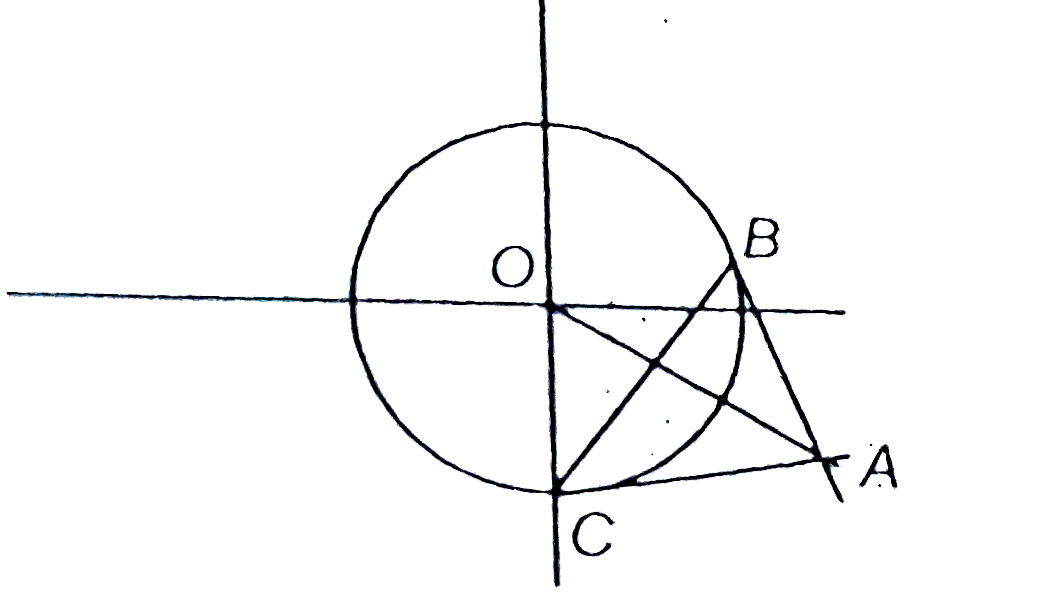The equation of the chord of contact of tangents drawn from a point (2,−1) to the hyperbola 16x2−9y2=144, is
9x+32y=144
32x−9y=144
32x+9y=144
none of these
To find the equation of the chord of contact of tangents drawn from the point (2, -1) to the hyperbola given by the equation 16x2−9y2=144, we will follow these steps:
Step 1: Convert the hyperbola equation to standard form
The given hyperbola equation is:
16x2−9y2=144
To convert it to standard form, we divide the entire equation by 144:
16x2144−9y2144=1
This simplifies to:
x29−y216=1
From this, we can identify a2=9 and b2=16.
Step 2: Identify the coordinates of the point from which tangents are drawn
The point from which the tangents are drawn is given as (x1,y1)=(2,−1).
Step 3: Use the formula for the chord of contact
The formula for the chord of contact for a hyperbola of the form x2a2−y2b2=1 is given by:
xx1a2−yy1b2=1
Substituting x1=2, y1=−1, a2=9, and b2=16 into the formula gives:
xx19−yy116=1
This becomes:
2x9+y16=1
Step 4: Clear the fractions
To eliminate the fractions, we can multiply through by the least common multiple of the denominators, which is 144:
144(2x9)+144(y16)=144
This simplifies to:
32x+9y=144
Final Answer
Thus, the equation of the chord of contact of the tangents drawn from the point (2, -1) to the hyperbola is:
32x+9y=144
---
The given hyperbola equation is:
16x2−9y2=144
To convert it to standard form, we divide the entire equation by 144:
16x2144−9y2144=1
This simplifies to:
x29−y216=1
From this, we can identify a2=9 and b2=16.
The point from which the tangents are drawn is given as (x1,y1)=(2,−1).
The formula for the chord of contact for a hyperbola of the form x2a2−y2b2=1 is given by:
xx1a2−yy1b2=1
Substituting x1=2, y1=−1, a2=9, and b2=16 into the formula gives:
xx19−yy116=1
This becomes:
2x9+y16=1
To eliminate the fractions, we can multiply through by the least common multiple of the denominators, which is 144:
144(2x9)+144(y16)=144
This simplifies to:
32x+9y=144
Thus, the equation of the chord of contact of the tangents drawn from the point (2, -1) to the hyperbola is:
32x+9y=144
Topper's Solved these Questions
- BOOK - OBJECTIVE RD SHARMA ENGLISHCHAPTER - HYPERBOLAEXERCISE - Section I - Solved Mcqs54videos
HYPERBOLA
- BOOK - OBJECTIVE RD SHARMA ENGLISHCHAPTER - HYPERBOLAEXERCISE - Section II - Assertion Reason Type4videos
HYPERBOLA
- BOOK - OBJECTIVE RD SHARMA ENGLISHCHAPTER - FUNCTIONSEXERCISE - Chapter Test29videos
FUNCTIONS
- BOOK - OBJECTIVE RD SHARMA ENGLISHCHAPTER - INEQUALITIES EXERCISE - EXERCISE SECTION-II (Assertion-Reason )1videos
INEQUALITIES
Similar Questions
The equation of the chord of contact of tangents from (1,2) to the hyperbola 3x2−4y2=3, is
View SolutionFind the equation to the chord of contact of the tangents drawn from an external point (−3,2) to the circle x2+y2+2x−3=0.
View SolutionFind the equation to the chord of contact of the tangents drawn from an external point (−3,2) to the circle x2+y2+2x−3=0.
View SolutionThe sum of the y - intercepts of the tangents drawn from the point (−2,−1) to the hyperbola x23−y22=1 is
View SolutionThe length of the chord of contact of the tangents drawn from the point (−2,3) to the circle x2+y2−4x−6y+12=0 is:
View SolutionStatement-1: The line x+9y−12=0 is the chord of contact of tangents drawn from a point P to the circle 2x2+2y2−3x+5y−7=0.
Statement-2: The line segment joining the points of contacts of the tangents drawn from an external point P to a circle is the chord of contact of tangents drawn from P with respect to the given circleView SolutionFind the equation of pair of tangents drawn from point (4, 3) to the hyperbola x216−y29=1. Also, find the angle between the tangents.
View SolutionThe tangents from a point (2√2,1) to the hyperbola 16x2−25y2=400 inculde an angle equal to
View SolutionIf the chords of contact of tangents from two points (−4,2) and (2,1) to the hyperbola x2a2−y2b2=1 are at right angle, then find then find the eccentricity of the hyperbola.
View SolutionLet the midpoint of the chord of contact of tangents drawn from A to the circle x2+y2=4 be M(1,−1) and the points of contact be B and C
 View Solution
View Solution
